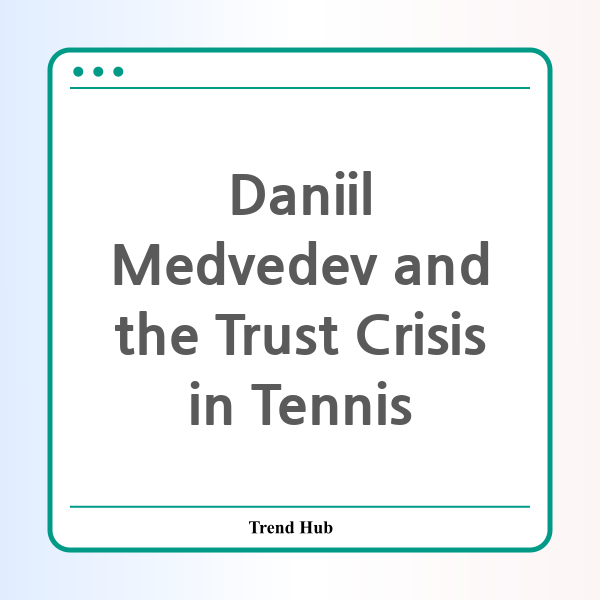* This website participates in the Amazon Affiliate Program and earns from qualifying purchases.

As the 2023 tennis season progresses, a shadow has been cast over the sport by recent controversies involving anti-doping agencies and the handling of players' cases. The conversations sparked by tennis superstar Novak Djokovic regarding the integrity of doping regulations have reverberated throughout the locker rooms, leaving players, including Daniil Medvedev, questioning the fairness of the current system.
At the forefront of the heated debate is the case of World No. 1 Jannik Sinner, who faced a three-month ban due to a positive test for the banned substance clostebol. Sinner attributed the presence of this anabolic agent to accidental exposure from a massage administered by a team member. Following the revelations, Djokovic publicly expressed his concerns, stressing that a significant number of players feel a profound lack of trust in the World Anti-Doping Agency (WADA) and the International Tennis Integrity Agency (ITIA). He claimed that the disparity in punishment between top-tier players and others creates a perception of favoritism, potentially corrupting the competitive landscape of tennis.
"Right now there is a lack of trust generally from the tennis players, both male and female, toward WADA and ITIA and the whole process," Djokovic stated during the Qatar Open. These sentiments resonate with many in the tennis community, including rising stars like Daniil Medvedev, who are keenly aware of how these developments impact the sport's reputation and the trust players place in regulatory bodies.
Critics have pointed out that Sinner's relatively light punishment starkly contrasts with cases of other athletes, which raises concerns over the consistency and logic of anti-doping enforcement. For instance, former women’s No. 1 Simona Halep received a four-year ban for her positive test before it was reduced to nine months. Similarly, British player Tara Moore was suspended for 18 months before her case was resolved. Such inconsistencies can lead to skepticism about the processes governing tennis, especially among younger players like Medvedev, who are striving to build a reputation in a sport where integrity is paramount.
Moreover, the timing of Sinner's ban and its implications for his participation in major tournaments have further fueled the narrative of unfair treatment. He will be eligible to compete in the Italian Open just days after his ban concludes, allowing him to prepare for the French Open without significant career disruption. This leads to questions about whether the system is truly enforcing a level playing field.
Supporters of WADA, however, have defended the agency’s handling of the Sinner case, with officials stating that this incident was “a million miles away from doping.” The agency's focus on transparency and operational integrity aims to eliminate fears of public or political backlash, but as players like Medvedev advocate for reform, it’s clear that faith in these agencies is crumbling.
In light of these developments, it’s evident that a pivotal moment is at hand for tennis. The calls for a systematic overhaul of anti-doping measures reflect a general consensus among players that these regulations need to evolve. As Djokovic articulated, this is an opportune time for the governing bodies of tennis to come together and craft a more effective and fair protocol for dealing with doping allegations. It is crucial for the future of the sport to restore players' faith in the integrity of these systems.
For upcoming athletes like Daniil Medvedev, the importance of a fair framework cannot be overstated. The integrity of tennis hinges on equitable regulations and the assurance that all players, regardless of their status or ranking, are held to the same standards. With the tennis world watching closely, it remains to be seen how these discussions will shape the future landscape of the sport.
As the issues unfold, players, fans, and sports authorities must recognize that trust is foundational in sports. The time for change is now, and the tennis community must rally to ensure that the game remains a symbol of fair play and integrity.
* This website participates in the Amazon Affiliate Program and earns from qualifying purchases.